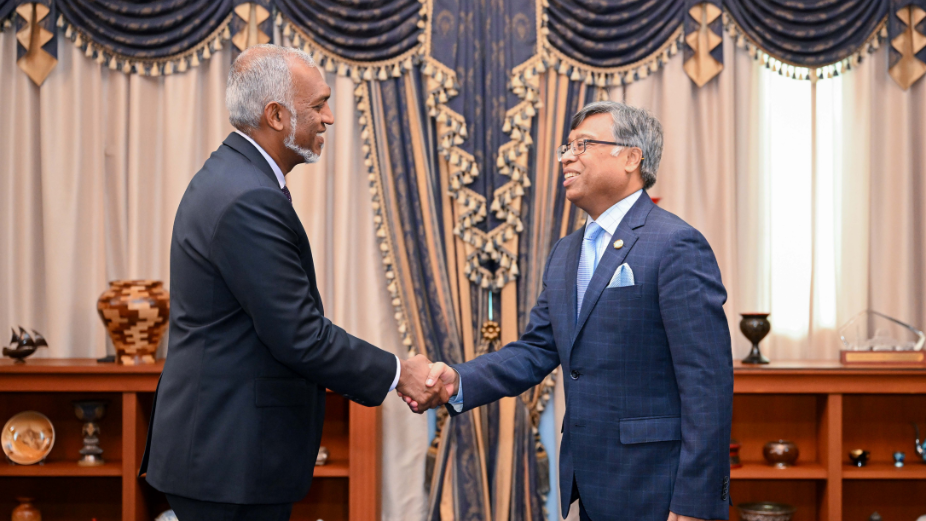
The Secretary-General of the South Asian Association for Regional Cooperation (SAARC), His Excellency Golam Sarwar, made significant diplomatic engagements today, meeting both President His Excellency Dr Mohamed Muizzu and Minister for Foreign Affairs Moosa Zameer.
In a morning visit to the President’s Office, Secretary-General Sarwar expressed his gratitude for the opportunity to meet with President Muizzu. During their discussion, Sarwar briefed the President on various SAARC programmes aimed at benefiting member countries. President Muizzu reaffirmed the Maldives’ unwavering support and commitment to strengthening SAARC, praising Sarwar’s leadership and expressing hope for enhanced regional cooperation in trade.
The President highlighted the Maldives’ longstanding commitment to SAARC since its inception in 1985 and its continuous contribution to the organisation’s development. As one of the founding members, the Maldives remains dedicated to the principles and objectives outlined in the SAARC Charter, signed in Dhaka on 8 December 1985.
Following this, Secretary-General Sarwar paid a courtesy call on Foreign Minister Moosa Zameer. During this meeting, Minister Zameer congratulated Sarwar on his appointment as the 15th Secretary-General of SAARC, expressing confidence in his leadership to steer SAARC towards achieving its goals. The discussions centred on reviving SAARC and the importance of regional cooperation in addressing shared challenges.
Minister Zameer was accompanied by Foreign Secretary Fathimath Inaya, Additional Secretary Mohamed Faisal, and Assistant Director Leen Fazeeh. Secretary-General Sarwar was accompanied by Shahiya Ali Manik and Bhavesh R. Trivedi, both Directors at the SAARC Secretariat.
SAARC’s Role and Potential in Regional Development
Established in 1985, the South Asian Association for Regional Cooperation (SAARC) serves as a crucial platform for fostering collaboration among its member countries: Afghanistan, Bangladesh, Bhutan, India, the Maldives, Nepal, Pakistan, and Sri Lanka. The primary objectives of SAARC are to promote the welfare of the people of South Asia, accelerate economic growth, and strengthen collective self-reliance among the countries of the region.
SAARC’s role as a regional organisation is vital in addressing common challenges such as poverty, illiteracy, and natural disasters. By facilitating dialogue and cooperation, SAARC aims to create a conducive environment for economic and social development. The organisation’s various programmes and initiatives, spanning areas like trade, health, education, and the environment, are designed to enhance the quality of life for the region’s people.
The potential of SAARC is immense. With a combined population of over 1.8 billion people, the region holds significant economic and strategic importance. Enhanced cooperation through SAARC can lead to greater regional integration, unlocking economic opportunities and fostering peace and stability. By prioritising collaborative efforts in trade, infrastructure development, and technological innovation, SAARC can drive sustainable growth and development across South Asia.
However, realising this potential requires renewed commitment and proactive engagement from all member states. Strengthening SAARC’s institutional capacity, promoting intra-regional trade, and addressing political differences are essential steps towards a more integrated and prosperous South Asia.
The high-level meetings between Secretary-General Sarwar and the Maldivian leadership illustrate the Maldives’ dedication to regional cooperation and its active role in SAARC. These engagements reflect a mutual commitment to revitalising SAARC’s initiatives and strengthening regional ties among member countries. As SAARC continues to evolve, its role in fostering regional cooperation and development remains indispensable for the future of South Asia.











